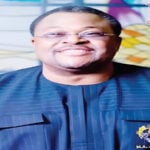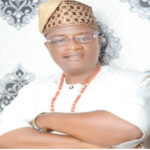On 7th April 2025, a day that will go down in history, the coronation of Alaafin Owoade was held with pomp and pageantry—with guests from all over the world. It was my pleasure to be a member of the coronation local organising committee. The coronation colloquium, for which I played a leading role, featured leading historians, including senior luminaries like Professor Bolanle Awe and Professor Anthony Asiwaju, and important authorities such as Professor Siyan Oyeweso (the keynote speaker), and Professor Akin Alao. The scholars brought the collective wisdom of generations to bear as they unpack the theme, The Alaafin in History and Modern Leadership: Preserving the Legacy, Defining the Future.
I was going to write a piece on the call of history for the new Alaafin, but as I started writing, it became clear that this has to be a different piece, and the original idea must wait just a bit. So, I will here offer reflections on some important lessons I learned in the course of “shopping” for speakers for the colloquium. I must first set the context, so you can hopefully bear with some of the details that will come later.
Few weeks ago, I co-hosted a virtual event in which one of the speakers, now a senior IT professionals based in the United States, narrated his ordeal in the hands of his former Masters supervisor when he attended a leading Nigerian university. The supervisor, among others, frustrated his PhD pursuit such that it never took off years after his registration. When he published parts of his Masters’ dissertation with due recognition for his former supervisor, the supervisor wrote to the younger man’s new employer accusing him of fraud. In the years following the former student’s departure to the US, the former supervisor fell on hard times- and it was to his former student he turned- and got help. The event soon became a cathartic moment for many participants on the call who narrated eerily similar accounts of their experience with the “Supervisor from Hell”, as it came to be known in the evening. They were tales of unbridled exploitation, frustration by design, and what some would describe as thoroughgoing evil- from academic mentors who behave like tin gods and do a lot of harm. We all agreed it is a “pancademic” that has to be addressed, especially on the African continent. This piece is a salutary counter-narrative to this- not to deny the terrible reality of the “Supervisor from Hell”, but also signpost that the solution to the problem is very much homegrown- right there on the continent.
It was the desire of the coronation committee to engage professional historians for the event, and that was not because non-historians do not have important things to say. Of course they do- I am not a professional historian, and I am speaking to this topic. It was simply decided that these academic scholars will set the stage for what was, in effect, a public conversation that should engage us all for the foreseeable future as we contemplate the fusion of tradition and modernity.
My first port of call was Professor Toyin Falola, the 72-year-old prolific scholar whose extensive works bestride the landscape of African history like a colossus. He was very willing but ultimately unable to make the date because of clashes with his commitments in the United States. He recommended the 86-year-old Professor Anthony Asiwaju, singing his praises as one of his mentors and academic father. Indeed, he went on to facilitate a conference call with Professor Asiwaju who in turn deferred to the younger Falola as the one who should deliver the keynote address. I was taking notes. When I subsequently followed up with Professor Asiwaju, he recommended changing the format from a “lecture” to a colloquium, and then proceeded to recommend three younger professors (Siyan Oyeweso, Olutayo Adesina and Akin Alao) as potential keynote speakers in place of himself. One of them could be the keynote speakers, he said, and he would happily join with others as discussants. So, on his advice, I contacted Professors Siyan Oyeweso and Akin Alao. Professor Adesina was unable to make it due to his commitments in England, but gave his full-throttled support every step of the way, as did the ever-generous Professor Falola. When eventually we got Professor Bolanle Awe on board as Chair for the occasion, Professor Asiwaju excitedly remarked that the 92-year old Professor Awe was his teacher at the University of Ibadan, and she had followed her career ever since.
I have gone into these details to reflect on the inspiring ethos of respect, support and camaraderie exhibited by these distinguished scholars- across generations. The older professors were happy to shine the light on their mentees, and their academic sons were unwavering in their deference and respect to the senior scholars. And to show that it was not performative, the same spirit was on display during the colloquium, in which Alao paid tribute to Oyeweso as his childhood friend and collaborator, and where Oyeweso saluted Awe, Asiwaju and Falola as his esteemed academic forebear. When after the colloquium, the four professors visited the new Alaafin and they were asked to speak, Professor Awe addressed the monarch. When Professor Asiwaju was invited to speak after, he declined, saying it was inappropriate for him to speak after his former teacher had spoken. He apparently judged he would always have future opportunities to engage the Alaafin- including one to one. I can only imagine the kind of relationship Professor Asiwaju has with his former teacher in the early sixties, such that he retained the highest respect more than sixty years after. The same for Falola, now a grandfather and great-grandfather in his own rights.
There was no sense of one trying to steal the other’s thunder; no attempt from the older academics to dim the light of the younger; or of the younger to ignore or disrespect the legacy of their older academic forebears. Yet there was ample evidence of intellectual independence and confidence from these scholars to bask each in their own light, while celebrating and acknowledging the accomplishments of their peers and seniors alike. They represent, in my view, an excellent, quintessentially African, model of academic mentorship that affirms and supports bold, forward-thinking scholarship without throwing away the fundamentals of respect and community. It is a model that embraces the virtue of what Yorubas would call Omoluabi while eschewing the vice of Agbaaya.
Academic mentorship is a solemn responsibility- and a privileged opportunity. The “supervisors from hell” should take note.
Seun Kolade, Professor of Entrepreneurship and Digital Transformation Sheffield Business School, United Kingdom
Email: seunkolade2014@gmail.com
23rd April, 2024.
READ ALSO: Pomp, colour, controversies and intrigues at Alaafin’s coronation
WATCH TOP VIDEOS FROM NIGERIAN TRIBUNE TV
- Let’s Talk About SELF-AWARENESS
- Is Your Confidence Mistaken for Pride? Let’s talk about it
- Is Etiquette About Perfection…Or Just Not Being Rude?
- Top Psychologist Reveal 3 Signs You’re Struggling With Imposter Syndrome
- Do You Pick Up Work-Related Calls at Midnight or Never? Let’s Talk About Boundaries







